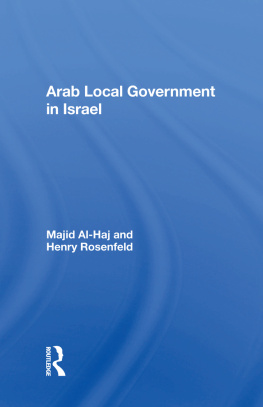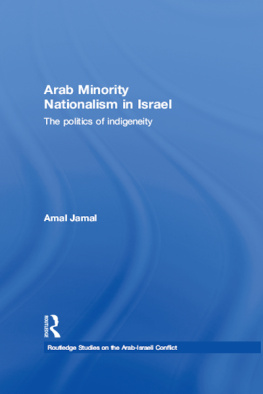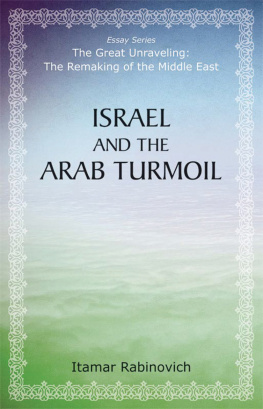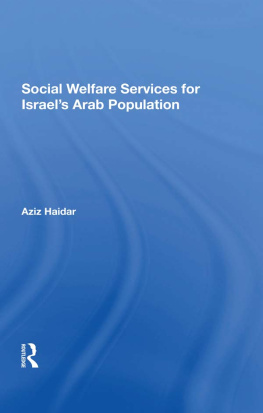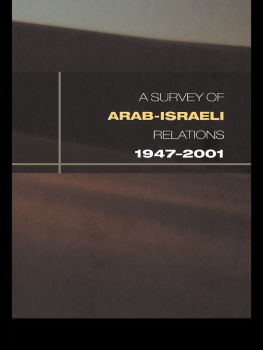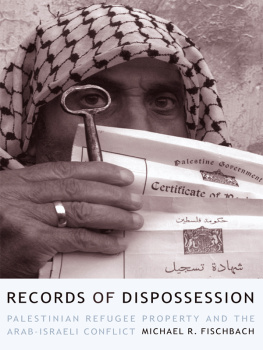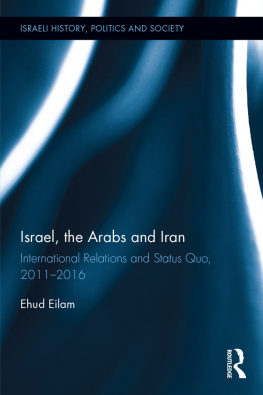Arab Local Government in Israel
A study in the project The Status and Condition of the Arabs in Israel under the direction of Professor Henry Rosenfeld
Published in cooperation with the International Center for Peace in the Middle East, Tel Aviv
The 750,000 Israeli Arabs are a national minority making up 17 percent of the population of Israel. In 1987 the International Center for Peace in the Middle East, together with Professor Henry Rosenfeld, director of the project, initiated a comprehensive research project on the status and condition of the Arabs in Israel. The focus of the research will be the Arabs' legal status, health and social services, and local authority in Arab communities. The books prepared by the project members report the empirical findings from the project and offer a penetrating analysis of the degree of social, economic, and political integration between Arabs and Jews, the extent of discrimination, and the degree to which rights and opportunities are shared by all.
Arab Local Government in Israel Majid Al-Haj and Henry Rosenfeld
In this book the authors present a historical analysis of local authorities in Arab communities prior to and since the establishment of the state of Israel. They discuss the workings of Arab local councils, municipalities, and national political groupings as well as the circumstances of internal conflicts in Arab settlements. They also present comparative data on budgets in Jewish and Arab communities.
Majid l-Haj is a senior lecturer in sociology and anthropology at the University of Haifa. Henry Rosenfeld is professor of anthropology at the University of Haifa and director of the Project on the Status and Condition of the Arabs in Israel.
First published 1990 by Westview Press, Inc.
Published 2019 by Routledge
52 Vanderbilt Avenue, New York, NY 10017
2 Park Square, MIlton Park, Abingdon, Oxon OX14 4RN
Routledge is an imprint of the Taylor & Francis Group, an informa business
Copyright 1990 by the International Center for Peace in the Middle East
All rights reserved. No part of this book may be reprinted or reproduced or utilised in any form or by any electronic, mechanical, or other means, now known or hereafter invented, including photocopying and recording, or in any information storage or retrieval system, without permission in writing from the publishers.
Notice:
Product or corporate names may be trademarks or registered trademarks, and are used only for identification and explanation without intent to infringe.
ISBN 13: 978-0-367-01313-4 (hbk)
The main purpose of this study is to discuss and to attempt to explain the situation of local administration among the Arabs of Israel As citizens of Israel, Arabs share with Jews specific administrative, political, legal, and other frameworks. However, as we have found in our work, formal structures may well be implemented differentially by the state and state agencies upon national, ethnic, sect, and other groupings; that is differentially for Arabs and for Jews. The state bears responsibility for many areas of inequality and discrimination that directly affect Arab local government. Meanwhile, social groups bring t radically new circumstances their histories, social and political structures, conflicts, aims, concerns, and so on; here, those specific ones around the founding of the state of Israel and the incorporation of a remnant Palestine Arab population into the state are of definite significance. Very often the tension between separate histories and/or seemingly diverse backgrounds, structures, and values and modern state frameworks is offered as an explanation for ongoing dissimilarities in life circumstances, levels of performance, and so on (for example, in local administration). In order to satisfy such claims, we approach our subject on Arab local administration in Israel in developmental terms. We discuss very briefly what we believe to be the key explanatory features of the Arab "local administration situation" prior to the establishment of the state of Israel in 1948; we then continue, here in greater detail, by discussing the processes of development of that situation within Israel, seeking out causal factors that help explain continuities, or seeming ones, with the past for Arabs, and those that point to similarities, convergences, and differences between Arabs and Jews over the past forty years.
Specifically, the book is built around five main chapters. The first chapter deals with incipient forms of local government in Arab Palestine during the Ottoman and British mandate periods with emphasis on the political and economic contexts within which they operated. We introduce the second chapter, concerned with local authorities in Arab settlements after the establishment of the state, with a brief discussion of some of the relevant features of the Israeli political economy as we understand them and of the particular situation of Arab local councils within the overall structure of local government. The main developments on the one hand and the problems that hinder the functioning of Arab local authorities on the other are analyzed in detail. The third chapter analyzes in depth the effect of municipalization on the socio-political structures of six Arab villages and towns: The intersection of both local and national forces is taken into consideration in order to explain developmental processes in these selected communities.
Budgetary problems in Arab settlements are discussed in the fourth chapter, including the main problems and trends over time. A comparison is made between seven Arab sample localities and seven Jewish communities in order to highlight differences and similarities in budgets, expenditure, services, and so on. In the fifth chapter we trace the emergence of the National Committee of Chairmen of Arab Local Councils in Israel as roof organizations having direct effect on the activities of, and coordination between, local authorities: the tension between the Committee's involvement in both municipal and national issues, its attempts to counter discriminatory practices against Arabs as citizens of Israel while insisting on their Palestine Arab national identity, and the mutual impact of the local level on the national level of politics. In light of our research, we analyze the growth and main repercussions of local government on the Arab population in Israel in a brief conclusion.
Research Methods
Our study utilized both qualitative and quantitative methods: bibliographical, historical, and documentary analysis; comprehensive field work investigation of sample localities; interviews; and analyses of press reports and secondary sources. Throughout, we give our interpretation of what we consider to be key processes. The comprehensive study of the sample localities was designed to gain an understanding of significant developments over time in Arab local government, of the social and political structure of village and municipal authorities, and of budgetary problems. For this purpose we selected Arab localities representing a cross section of the Arab local authorities according to municipal status, geographical location, population size, and religious composition. A parallel sample of Jewish localities was also selected for a comparative study of budgets. Our research on a Bedouin community in the Negev did not develop along the lines we had planned, and we do not include our findings here.


